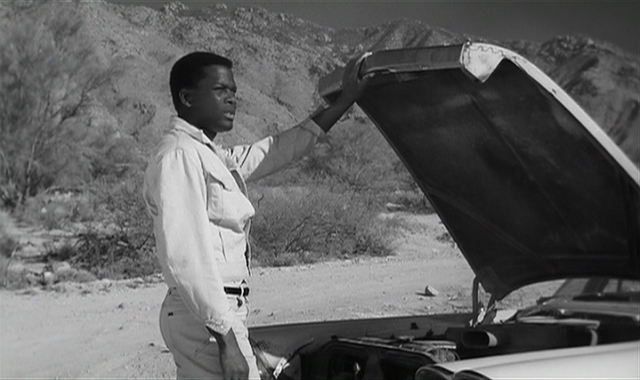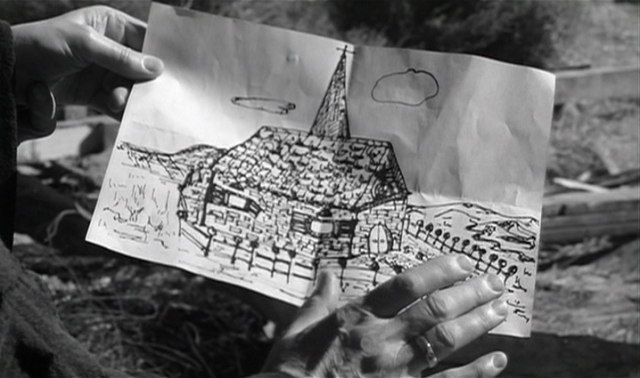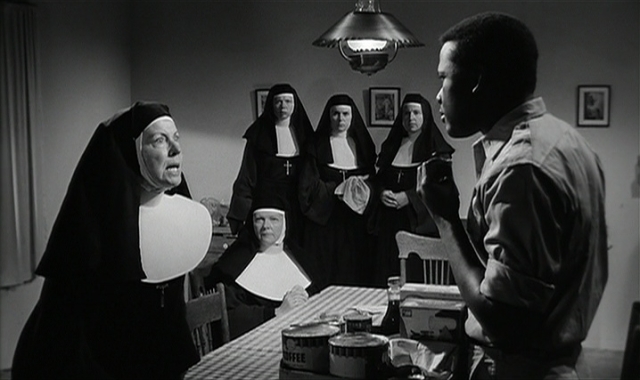
To Homer Smith (Sidney Poitier), an overheated engine is just an overheated engine; to Mother Maria (Lilia Skala), it’s divine intervention.
Either way, it disrupts Homer’s drive through the Arizona desert at the beginning of the 1963 film Lilies of the Field and prompts him to seek water at the nearest building. This turns out to be a convent, home to Mother Maria and four other nuns (Lisa Mann, Isa Crino, Francesca Jarvis, Pamela Branch) who have come to the United States from East Germany. “God is good. He has sent me a big strong man,” Mother Maria declares upon seeing Homer, then informs him that she has work for him to do. Although he’s not interested at first and starts to drive away, the nuns’ sad faces bother him, and a glance into his wallet reminds him that he could use the money; he is, in fact, an itinerant laborer, and this job is probably no worse than any other he might encounter. As such, he agrees to fix their roof, intending to leave as soon as he’s finished — but Mother Maria has other plans for him.

He soon learns that the nuns want a chapel built on their property, because as things currently stand, they and the other local Catholics have to attend Mass held out of the back of a station wagon. Mother Maria is certain that “Schmitt,” as she calls Homer, is the answer to their prayers; he disagrees. A battle of wills ensues: she insists, he resists, especially when he hears that the nuns have no money and can’t even pay him for the work he’s already done. He’s a kind man, a generous man, happy to teach them English and help them out within reason, but he’s also too practical and too proud to take on such an overwhelming task for free. Still, the flinty, faithful Mother Maria is unwavering in her conviction, and at last, Homer finds a way to make the project feasible. He obtains a job at a nearby construction company, where he’ll work two days a week for a Mr. Ashton (Ralph Nelson, the film’s director); the rest of his time will be devoted to building the chapel.
Of course, agreeing to build the chapel and actually doing it are two very different things, and hard physical labor and a shortage of materials aren’t Homer’s only problems. His greatest challenge may be Mother Maria herself. It’s natural enough that they should fail to understand each other and even clash, separated as they are by religion (she’s Catholic, he’s a Baptist), by race (she’s white, he’s black), by language, by background, and by countless other differences. Moreover, they both have strong personalities, and Homer, accustomed to independence, doesn’t take kindly to being ordered around and scolded for waking up late and criticized for buying unnecessary food. He goes so far as to compare himself to a slave and tell Mother Maria that she sounds like Hitler; not surprisingly, she doesn’t take kindly to that.

For a while, the tension between them threatens to derail the project entirely. Salvaging it requires forgiveness, humility, cooperation — divine qualities, one might say — and this extends beyond Homer and Mother Maria. Members of the local Catholic population eventually provide the necessary materials, and although a stubborn Homer insists that he wants to do the whole job himself, they also join in the labor. It doesn’t always go smoothly. Because the vast majority of them are Hispanic, there are still more language and other cultural barriers to overcome, not to mention the sorts of conflicts that inevitably ensue when people try to work together; even so, the advantages outweigh the problems in the end, and the chapel is all the more significant because it was built through a community effort.
The construction process and the building itself mean different things to different people. To the nuns and the other Catholics, it’s a place where they can worship and receive the sacraments; to restaurateur Juan (Stanley Adams), an ex-Catholic, his work on the chapel is insurance in the event that there’s an afterlife; to Mr. Ashton, who donated the first bricks, it’s a tax deduction. And to Homer? What was once an unwanted job forced upon him becomes a deeply rewarding experience — not a pleasant one sometimes, but one that he’s not likely to forget anytime soon, no matter where the road takes him next.
This post is part of the 90 Years of Sidney Poitier Blogathon, hosted by The Wonderful World of Cinema. Click the banner above to see all of the other great posts.


This is one of my fave movies. I love the scenes between Poitier and Skala – such intense chemistry! Even though I saw this just recently, your review makes me want to see it again. 🙂
LikeLiked by 1 person
They’re great together, aren’t they? This was only my second viewing, but I plan to add it to my collection it the near future. It was actually your post about it a few months ago that reminded me how much I enjoyed it the first time!
LikeLiked by 1 person
Such a thoughtful and joyous film about how down-to-earth people can truly be extraordinary.
Observation: this was a favourite film of my late father, and after we married I discovered it was a favourite of my husband. Our son is autistic and developmentally delayed, but guess what is one of his favourite films? I believe he looks upon Homer Smith as a pal.
LikeLiked by 1 person
That’s really sweet. 🙂 Movies can mean so much, especially within families.
LikeLike
Pingback: The 90 Years of Sidney Poitier Blogathon is here! | The Wonderful World of Cinema
Oh wow…this really took me down memory lane. It must be at least 20 years since I’ve watched this one on those Super 8 reals my parents rescued from being tossed way back then. I really need to re-watch this one. Looooong overdue….thank you for reminding me of this wonderful movie.
LikeLiked by 1 person
You’re welcome, and thanks for reading!
LikeLiked by 1 person
Lovely review! I used to watch this all the time as a child, but it has been so many years since I have seen it and your post shows how I probably didn’t fully grasp all the nuances of the film at the time. 🙂
LikeLiked by 1 person
Thanks! It’s always interesting to revisit a film you haven’t seen in a long time, because you’re sure to get something new or different out of it.
LikeLiked by 1 person
“To Homer Smith (Sidney Poitier), an overheated engine is just an overheated engine; to Mother Maria (Lilia Skala), it’s divine intervention.” Love that! And I also love the title of your article.
This was a great and complete review of Lilies of the Fields. It’s a beautiful film and I truly believe this was Sidney Poitier’s best performance. This Oscar was totally deserved. Thanks again for your participation! 🙂
LikeLiked by 1 person
Thank you, and thanks for hosting the blogathon! He really is great in this movie.
LikeLiked by 1 person
That’s a great inspirational film. Me and my grandma, who watched with me, liked it very much. I agree that many rewarding experiences are not necessarily easy. Great review.
Kisses!
Le
LikeLiked by 1 person
Thank you!
LikeLike